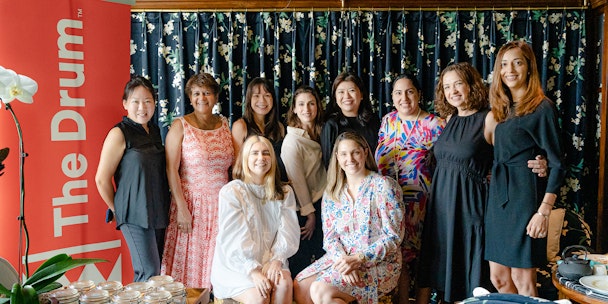How can the marketing industry support the next generation of female leaders?
Media and marketing leaders from Mindshare, KFC, Xaxis, Bloomberg, Dentsu, AppLovin, Disney and Grab come together in Singapore to discuss how the industry can collaborate to support the next generation of female leaders.

A key area for improvement is the inclusion of women when creating policies that impact women.
Singapore boasts the highest percentage of women chief executive officers globally, according to a recent Deloitte report. It is a significant achievement, but at 13%, there is still work to close the gap between men and women in leadership roles.
The Drum teamed with ad tech company Integral Ad Science (IAS) to host a roundtable discussion with some of Singapore’s brightest media leaders from Mindshare, KFC, Xaxis, Bloomberg, Dentsu, AppLovin, Disney and Grab to discuss the equity gap in leadership roles and what's needed to support women leaders across the industry.
While Chatham House Rules were in operation, there were several key themes and trends to emerge from the discussion.
Be the change you wish to see
Speaking at the company’s initial public offering (IPO) in June, IAS chief executive Lisa Utzschneider said, "If you can see her, you can be her". With leadership roles still predominantly held by men, the need for women to occupy the top jobs in companies is more important than ever.
Yet, achieving equal representation of women in senior leadership positions remains one of the most significant challenges across our industry and society in general.
"We don't know what we don't know. When you have women in senior positions, they understand what it was like to get there and are more inclined to have policies and structures in place to support others. But it's a kind of chicken and egg situation, and that's why we must have advocacy from women in senior positions to help other women."
The global trend to improve diversity, equity and inclusion (DEI) within businesses through policies and programs is a welcome change within the market. However, many believe the foundational change will take time to have a significant effect.
“I worked at a company that had mandatory inclusion goals and made a point of reporting the diversity of different departments, which was good to stop over-indexing on men. The trouble with these policies is that they can reduce the credibility of women and create imposter syndrome.”
Increasing gender equality through courses, training and development programs is generally viewed as a more positive way to help retain staff and create the structures to promote women up to leadership positions.
“Our company has a great mentoring program globally, but I’m going to explore whether we can open that up locally. I’m conscious that you have to put your hand up for it, and not many women did. So, we could re-examine this and consider making it women-only to improve its effectiveness."
It’s more than maternity leave and childcare
Women re-entering the workforce after having children is one of the most significant areas for improving the equity gap in leadership roles. While many companies are implementing better parental leave options, remote working options and greater flexibility around working hours, more work is needed. A key area for improvement is the inclusion of women when creating policies that impact women.
“The people creating the policies need to understand what the issues are. It's not just about the woman returning to work, it's about the managers, and it's about the business being able to provide assistance to women as they re-enter the workforce. That requires greater understanding and an ability to put themselves into someone else’s shoes and understand the needs.”
"Companies need to proactively reach out to women about their needs because it's not all about childcare. There's a whole host of other issues about progression such as pay rises and mentorships that have to be discussed.”
“My company just installed policies around maternity leave as well as menopause, miscarriage, IVF – it's not just having a kid; it's the choices of being a woman and physically what happens to you and how that impacts your work.”
“It's not just about women returning from maternity leave, but about adjusting to work – and life – as a mother. There is a huge adjustment period when women come back to work, but most businesses expect you to be straight back into things. I think there's a need for policy or at least better understanding about this adjustment and how we can help support women more.”
Open conversation
One of the biggest recurring themes is the need for more open conversations about the challenges women are facing if we are to overcome them. There is a need for greater transparency around pay grades, salary benchmarks, hiring initiatives and unconscious bias. Companies need to install actions and plans that can help promote more significant equality within leadership roles.
Earlier this year, the Singapore Government released a white paper on Women’s Development, which outlined proposals to ensure equal opportunities for women across the country.
These included greater representation of women on company boards, entrenching flexible work arrangements as a workplace norm, encouraging parental leave entitlements, career mentorship, training for women to re-enter the workforce and greater legislation around fair work.
It's a welcome and positive step forward for a country already leading the world in gender equality among CEOs.
“It’s important to say that things are getting better. But there is still change required. And if as women we vocalize that, then maybe we will see the change that we need."
"Make time to talk to your team, arrange mentoring sessions, encourage teams to seek out mentors and about challenges and support one another". It's important to make sure that we talk about equal pay for equal work and encourage women to speak up when it comes to getting fair remuneration."
Content created with:

Integral Ad Science
Integral Ad Science (IAS) is a global leader in digital media quality. IAS makes every impression count, ensuring that ads are viewable by real people, in safe and...

